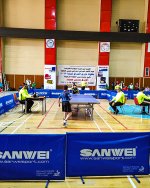There has been quite a few juniors from USA, both boys and girls playing in your "top destination" countries.
Happening today and the past decade.
Would Kanak choose TT full time or not....
I like to see someone a bit knowledgeable of TT in the USA to comment on this. Is it even close to viable for a player to play full time based in the USA.
Now I am talking about TT as an income for the rest of your life....
Maybe play Pro in Europe and retire in USA and start coaching?
I am fairly knowledgeable as I am friends (in a few cases close friends) with a handful of the top US players over the last 20 years or so (the ones who live or lived in Houston). That list would include three former US champions, along with three other former USA national team members. I am also old enough to see how things have worked here for a long time.
The answer is TT is not very viable for American players. Among this group of six, only one of them currently makes his living primarily from table tennis (Timothy Wang). The others, who are a lot older, include Jim Butler, Eric Owens, Viktor Subonj, Darko Rap, and Niraj Oak. They mostly made their living in other ways, even at the prime of their careers in the US. Viktor teaches school, Eric, Darko and Jimmy are massage therapists, and Niraj is an engineer. Timothy is currently one of the principals in a new TT club here that is fantastic, and is already attracting swarms of children, which is nice to see. He makes some money playing, more coaching (I am one of his students). I hope it works out. Too soon to know for sure.
Actually, when Viktor first came to the US he made his living coaching -- barely!!!! His income was so tenuous he ended up getting a teaching certificate (he already had a BS from Romania) and then a MS degree and now he is a school principle. Same with Darko in terms of having to fairly quickly find a different way to make a living here. Niraj is a special case, he never made any money playing, but was also nowhere near the same level as those guys, and he has always considered himself to be a completely amateur player.
I don't honestly think you can make a living playing TT
in the US unless you win almost every tournament you play. Problem with that strategy is that these days enough Chinese players come here that winning every tournament is not something you can count on. Historically (going back some 20-25 years or so), in the US some really good Chinese player would come and dominate for a few years. I am thinking of guys lik Cheng Yinghua, and after him Fan Yiyong. Those guys would win every tournament for awhile and could support themselves mostly by playing. But now there are enough young Chinese guys coming that no one of them can really dominate for long, especially since their playing level drops rapidly without the same level of training and practice partners they had in China (and if they have to coach also).
It is a pretty grim picture at the moment.
But most of these people coming to the US are also coaching kids. So like Tony says, with kids there may be some basis to grow the sport (especially if by some miracle it can be taught more in schools). As things stand now, any good young players produced here are going to have to leave the country to play professionally. Most won't. Most will go to the university and do something useful with their lives.
Now, some will go and play abroad. Jim Butler was actually doing that in Sweden in the 90s until injuries caught short his first career. He was also around 70 in the world at his best. Timothy played a couple of years in Netherlands (while living in Belgium). Eric trained a lot abroad (Sweden, Korea, China) but I don't think he ever competed professionally on club teams there. Niraj, Viktor, and Darko all played for junior national teams (in India and former Yugoslavia) before coming here. Actually I think Darko was on the Yugoslavian men's national team. Viktor and Darko escaped what was then a war zone to come here, but what they found when they got here was a real economic grind. Extending this to people who I don't actually know, Eric Boggan way back in the 80s played professionally abroad (but was also in the top 30 in the world). After awhile he didn't want to do that anymore.
The problem is that most of the male juniors we have produced here pretty much ever since Eric Boggan simply aren't good enough to make much of a living playing professionally in most of Europe or Asia. If they are paying you, you had better win. Kanac Jha may be different, we will see. The girls from here probably are good enough, but also seem to have other things they want to do.













